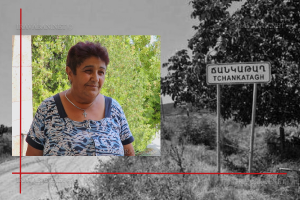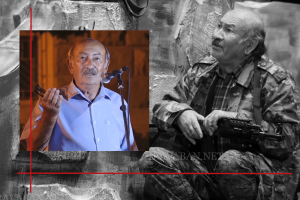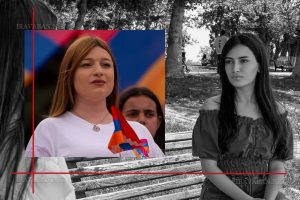Nanar Poghosyan, forcibly displaced from the occupied Republic of Artsakh, told in the framework of “Artsakh: Armenian Genocide 2023. Stories of Survivors” documentary project, about the difficulties of the siege and the consequences of the last attack. Our hero was born in Kaghartsi village of Martuni region.
Nanar says that she is a generation of victory and tells the story of her birth, how her mother was taken to the hospital accompanied by a tank.
“My maternal grandmother asked for a patrol and an ambulance accompanied by a tank came and an armed group took my mother to the hospital. My being brave and unbreakable probably started from the story of my birth,” Nanar says.
On 27 September, 2020, Azerbaijan unleashed a war against Artsakh, targeting the civilian population as well. Many people had to leave their homes that time, but not Nanar, she stayed in her birthplace and fought for the freedom of Artsakh, the future and the right to live in Artsakh.
“I did not go out in 2020 because it was my duty. We had to serve the motherland. How dare you leave your mother alone and leave, at that moment Artsakh was wounded, at that moment it felt the need of all of us and I do not distinguish between genders. All men and women are obliged to serve the motherland. Along with my work, I delivered food and necessary supplies to the positions, the boys and the people who stayed in the basements. The drones constantly fixed my car; I often stopped it, got down to hide. I went to the places of the incident and took pictures with my phone of what happened to present the situation to the world. I made constant appeals, but as you know, the world was silent,” she said.
Our interlocutor says that she never imagined her life outside of Artsakh.
“I traveled a lot, but when I returned to Artsakh, my heart stopped. The house and the land are one thing; the place where you were born is different. It is torture when you have a homeland, you have land, but you live in a foreign country. Even during the war, I never once thought that I should leave Artsakh. It is mine. How can you say I love the motherland, but live somewhere else? Loving the motherland means living in the motherland. You cannot go to a foreign country and say: I love Artsakh. It is false to me. If every person, everyone at their workplace realizes their work as a service, we would not have reached this situation either,” she says.
Nanar also told about the unbreakable type of Artsakh people during the 9 months of the illegal blockade of Artsakh. Empty shops, queues for bread, hungry and half-starving people. But Nanar has shown on various platforms that they are not broken, that they are fighting and will endure, as long as they live in their home, Artsakh.
“I always wish on those days. People who have not lived and felt such days will not understand what was said in the enclosure, but I lived my daily life in the same way. I was not so bothered by the lack of gas, light, the empty shops, as much as the fact that our rights were violated. The struggle of the Artsakh citizen was not for hunger, the struggle of the Artsakh citizen was for their violated rights. We did everything to make the voice heard, but it was all in vain, that’s why I do not believe in any humanitarian rights, because when you have lived that life, you have seen it, you cannot believe that something will be OK.” – she says.
When talking about 19 September, 2023, she mentions that she was in a beauty salon when the enemy unleached another aggression against Artsakh.
“It was the last moment, when they bombed, there was no one left in the salon, I started to do my hair myself, I thought: well, if we are going to die, die beautifully. I thought it was another shooting, it will end soon,” she said and smoiled.
The shooting was not like the other ones and did not end quickly. Nanar did not have any contact with her relatives, she went to her mother’s workplace, but did not find her there, she only found out where her younger sister was, because she was in the hospital with the child.
“Later, I went to the children’s hospital and found my mother there. The horror started later, the husbands of my sisters did not appear for several days: they were in positions. My sisters cried all the time. My brothers-in-law were under siege, I did not know what to do. When we did not hear from them for three days, we were already crazy. I went to the morgue; I will never forget those scenes and started looking. They kept bringing dead bodies; I will never forget those experiences. They were frozen, wet; I went up alone to look around to see if my brothers-in-law were there or not. Faces of many people were unrecognizable. The next day I went again to look for my sisters’ husbands, my younger sister came with me, she waited outside and I went in again and started looking in the refrigerators. The worker said that they brought a body from Martuni, it has not been submitted for recognition yet, I looked and it resembled my brother’s close friend, Vitaly. I went out, told my sister, that none of the grooms are there. I remember that before Vitaly went to the positions, he came to our house, my brother said to wait, we will go together, but he did not wait. I told my brother that I saw his friend’s body, but I do not know… My brother went to the morgue, came and said it was him. He was killed in the same position where my brother was. The Martuni-Stepanakert road was already closed, Vitaly had to be buried and his mother could not participate in her son’s funeral. Her sister asked me to take a picture of her dead brother for her mother to see,” she said.
Then the husbands of the sisters left the blockade and they left Artsakh together on 25 September. She says that what happened was genocide.
“When crossing the Hakari bridge, I was afraid that they wouldn’t let me go out, because they were constantly spreading my video that I was putting the Artsakh flag on top of Ararat, and they presented me as a separatist,” she says.
However, Nanar crossed the bridge and now says that it is necessary to fight to strengthen and strengthen the country.
“We had a victorious Artsakh and if we all lived in Artsakh, Artsakh would not have appeared in this situation,” Nanar Poghosyan emphasizes.
————————
Iravaban.net seeks help from citizens who will voluntarily agree to translate materials into different languages: Russian, English, French, Arabic, Persian, Turkish, Georgian, Chinese…
You can write to our e-mail address at: [email protected]
To donate for realization of the project: https://iravaban.net/en/become-a-supporter
Armenian Lawyers’ Association is the author of the idea “Artsakh: Armenian Genocide 2023. Stories of Survivors” documentary project of Iravaban.net and is the owner of copyright of the materials created within the framework of the project. In case of using the materials produced within the framework of the project, it is necessary to obtain the written permission of the Armenian Lawyers’ Association.
Details in the video.
Hasmik Sargsyan

















